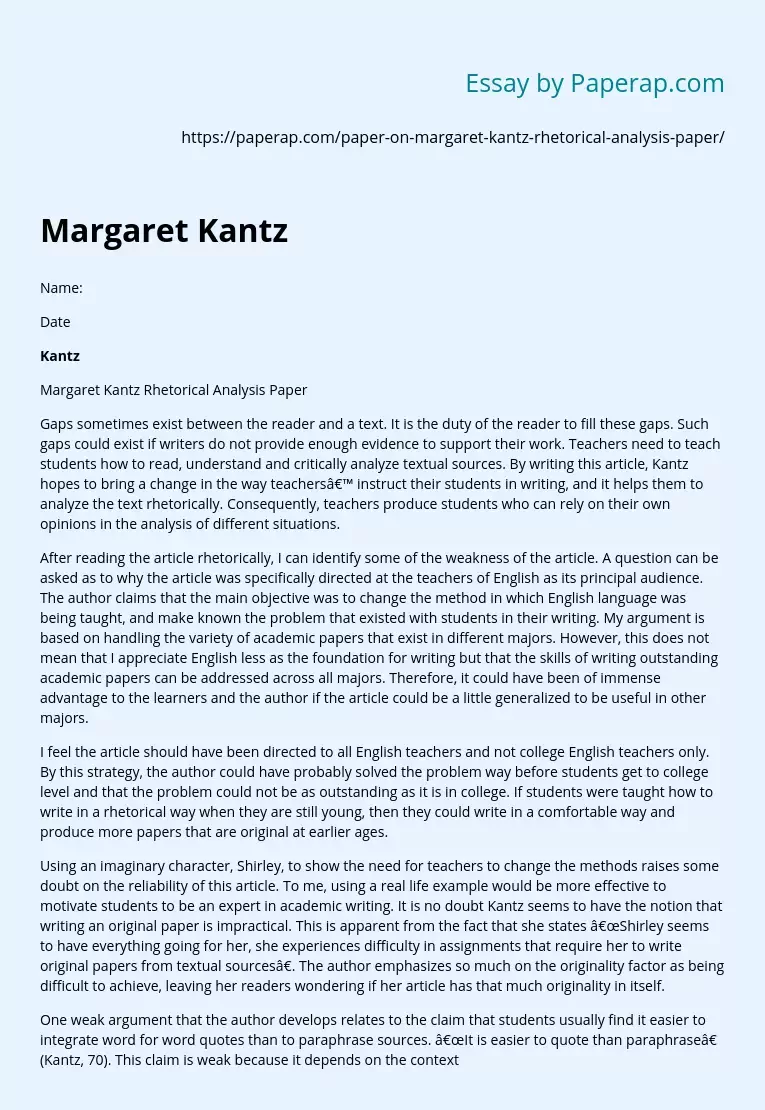Revolutionizing Education: A Call for Change by Margaret Kantz
The following sample essay on: “Margaret Kantz”. By writing this article, Kantz hopes to bring a change in the way teachers’ instruct their students in writing, and it helps them to analyze the text rhetorically.Gaps sometimes exist between the reader and a text. It is the duty of the reader to fill these gaps. Such gaps could exist if writers do not provide enough evidence to support their work. Teachers need to teach students how to read, understand and critically analyze textual sources.
Consequently, teachers produce students who can rely on their own opinions in the analysis of different situations.
After reading the article rhetorically, I can identify some of the weakness of the article. A question can be asked as to why the article was specifically directed at the teachers of English as its principal audience. The author claims that the main objective was to change the method in which English language was being taught, and make known the problem that existed with students in their writing.
My argument is based on handling the variety of academic papers that exist in different majors. However, this does not mean that I appreciate English less as the foundation for writing but that the skills of writing outstanding academic papers can be addressed across all majors. Therefore, it could have been of immense advantage to the learners and the author if the article could be a little generalized to be useful in other majors.
I feel the article should have been directed to all English teachers and not college English teachers only.
By this strategy, the author could have probably solved the problem way before students get to college level and that the problem could not be as outstanding as it is in college. If students were taught how to write in a rhetorical way when they are still young, then they could write in a comfortable way and produce more papers that are original at earlier ages.
Using an imaginary character, Shirley, to show the need for teachers to change the methods raises some doubt on the reliability of this article. To me, using a real life example would be more effective to motivate students to be an expert in academic writing. It is no doubt Kantz seems to have the notion that writing an original paper is impractical. This is apparent from the fact that she states “Shirley seems to have everything going for her, she experiences difficulty in assignments that require her to write original papers from textual sources”. The author emphasizes so much on the originality factor as being difficult to achieve, leaving her readers wondering if her article has that much originality in itself.
One weak argument that the author develops relates to the claim that students usually find it easier to integrate word for word quotes than to paraphrase sources. “It is easier to quote than paraphrase” (Kantz, 70). This claim is weak because it depends on the context of the student’s writing. For example, if a student wants to quote in an effective way, he must have read the source, either in summary form or in its entirety. Otherwise, the student will find it hard to determine whether the quote fits the subject or not. In addition, a student usually has to cite the source accurately. One should keep in mind the fact that the internet nowadays is the first choice for many students who want to conduct research, where many of the written texts are not available online as a full text. Therefore, it would be hard for a student to obtain correct reference details for many sources. On the other hand, paraphrasing is easier because the student only needs to have an idea of the subject of a text and then use this text to create ideas and incorporate the thoughts into paper.
Another weak argument that I do not agree with is that the author states ‘Writing an original, persuasive argument based on sources requires students to apply material to a problem or to use it to answer a question, rather than simply to repeat it or evaluate it’ (Kantz 72). Through this statement, Kantz appears to dismiss the value of evaluation in the persuasive writing process. This is despite the fact that evaluation is a core aspect of rhetorical writing. Looking up the meaning of the verb ‘evaluate’ could help to augment this point. According to the Merriam Webster English dictionary, ‘to evaluate’, means ‘to determine the significance worth, or condition of usually by careful appraisal and study’ or ‘to determine or fix the value of’ (Merriam-Webster, Incorporated). From this definition, is clear that ‘evaluation’ is a core aspect of rhetorical reading as it helps learners to determine the ‘value’, ‘worth’, or ‘condition’ of texts by careful study and appraisal. In this context, I am wondering how a learner can create an original argument from a text without first evaluating it.
In conclusion, the main gap is that the article is directed to specific people, whereas the issues have an exceptionally wide scope. In addition, one can see that the article has a limitation based on the stage where rhetorical writing is being emphasized, while it should be taught at a much younger age so that learners can get accustomed to rhetorical writing at an earlier stage of development. There would be more benefits for high school students if they were taught rhetorical writing than if college students were given the same tutoring, because the younger individuals would learn how to write more efficiently.
Revolutionizing Education: A Call for Change by Margaret Kantz. (2019, Dec 05). Retrieved from https://paperap.com/paper-on-margaret-kantz-rhetorical-analysis-paper/

